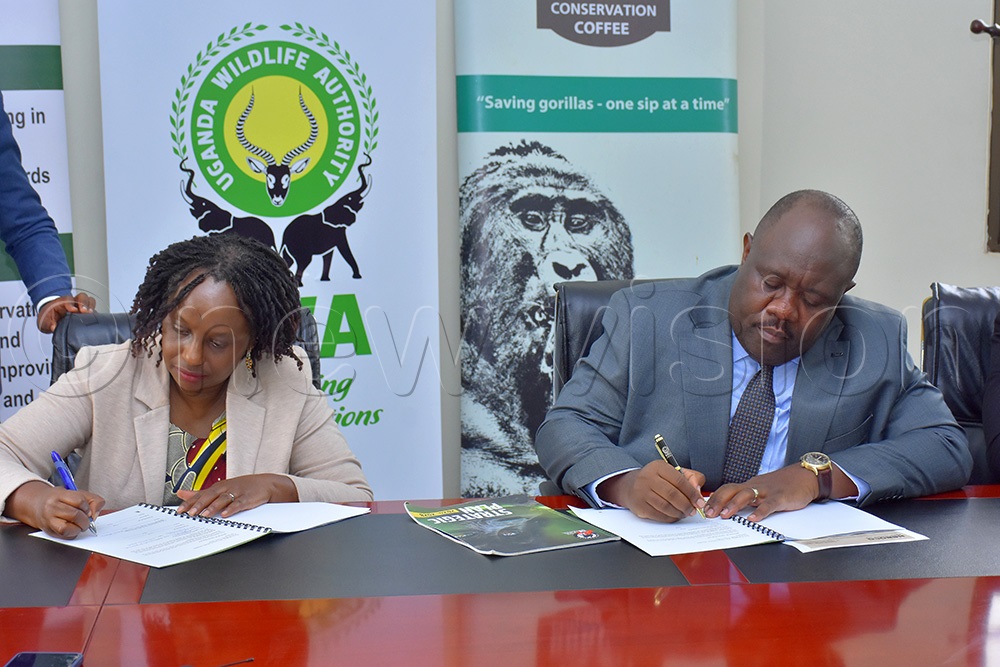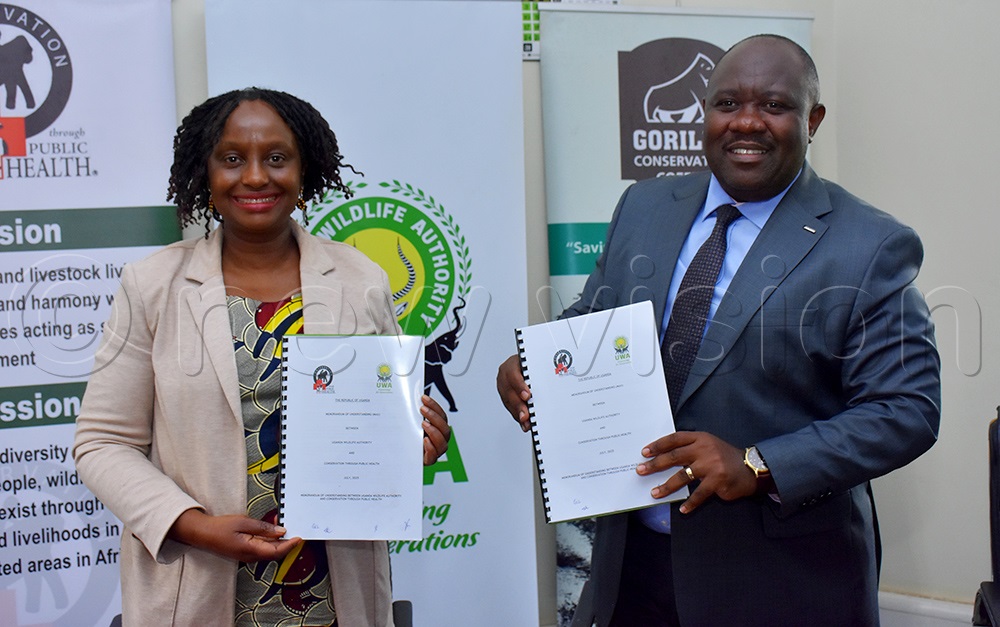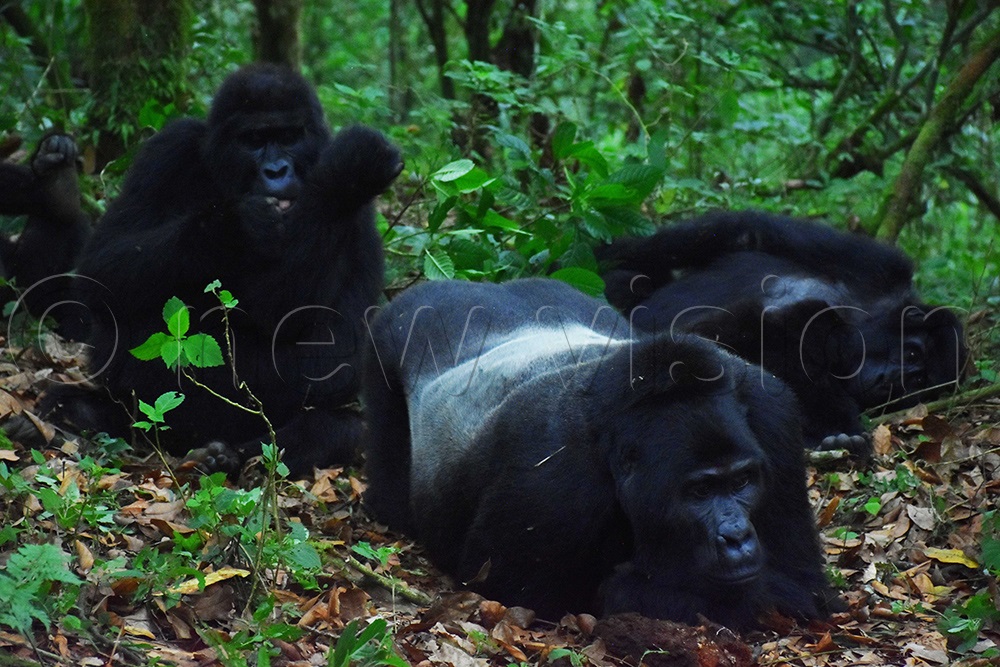UWA in renewed partnership to enhance gorilla, human health
Last week, UWA signed a memorandum of understanding renewing partnership with a local non-governmental organisation (NGO) to promote the health and wellbeing of people, gorillas and other wildlife.
The renewed Memorandum of Understanding was signed by Dr Gladys Kalema and Steven Rubanga (left) on behalf of CTPH and Dr James Musinguzi and Sabilla Chemongesi on behalf of Uganda Wildlife Authority. (Photo by Julius Luwemba)
_________________
The Uganda Wildlife Authority (UWA) has renewed efforts to eradicate cross-transmission of diseases among humans, wildlife and livestock in and around Uganda's protected areas.
Last week, UWA signed a memorandum of understanding renewing partnership with a local non-governmental organisation (NGO) to promote the health and well-being of people, gorillas and other wildlife.
Dr Gladys Kalema (left) of CTPH and Dr James Musinguzi, the executive director of Uganda Wildlife Authority renewing a memorandum of understanding between the two parties in regards to gorilla conservation. (Photo by Julius Luwemba)
Led by Dr. Gladys Kalema-Zikusoka as the chief executive officer, the Conservation Through Public Health (CTPH) has been pivotal in guiding rangers, porters, researchers, trackers, tourists and surrounding communities on how to interact and co-exist on the same land with habituated great apes without transmitting diseases.
The renewed 5-year partnership signed on Thursday, at UWA headquarters in Kampala will see the NGO develop strategic and long-term programs that relate to health enhancement of wild animals, humans and livestock as well as conducting educational and training programmes that promote 'One-Health' approach to enhance community attitudes towards public health and wildlife conservation issues.
"We shall also continue to carry out scientific investigations and research related to disease transmission and other related issues to improve responsible wildlife tourism and reduce illegal activities and human-wildlife conflict," Dr. Kalema expressed.

Dr Gladys Kalema and Dr James Musinguzi after renewing a memorandum of understanding between the Uganda Wildlife Authority and the Conservation Through Public Health at UWA headquarters in Kampala. (Photo by Julius Luwemba)
CTPH began its collaboration with UWA in 2004.
Dr. James Musinguzi, the UWA executive director, lauded the works done by CTPH in the past years, saying the renewal of the MoU is testament to the past achievements by the NGO, especially towards gorilla welfare and conservation.
"It's greatly because of the CTPH works that the mountain gorillas were delisted by the International Union for Conservation of Nature (IUCN) from being critically endangered to endangered species. This implies their numbers have greatly increased," Musinguzi noted.
"Therefore, this is a partnership being renewed as a result of tremendous achievements and benefits that we have been able to achieve together," he added. According to Musinguzi, partnerships are vital for conservation because "we are dealing with a multi-faceted and multi-disciplinary resource with so many stakeholders."
"UWA is also planning to acquire part of the community land in the Nyamushamba area, around Bwindi national park to plant more trees and create more habitat for the gorillas because the numbers are increasing," Musinguzi stated.
Sharon Akampurira, a community health and conservation field officer in areas of Buhoma, Kanungu district, explained that CTPH has also managed to engage communities staying around Bwindi national park, to observe general hygiene, family planning and conservation. "When people produce few children, there shall be low population pressure and therefore, less encroachment on the Bwindi fragile habitat, which is shared by both humans and wildlife," explained Akampurira.

Gorillas of Rushegura family in Buhoma sector of Bwindi national park, led by the Silverback Kabukojo. (Photo by Julius Luwemba)
Naome Ayesigwa, the Village Health and Conservation Team (VHCT) in Kanungu district, said, given the hilly terrain of landscapes surrounding Bwindi forest, wastes, among other polluting agents, can easily find their way into the gorilla habitat and the water streams that flow through Bwindi national park. "This is one of the major reasons we engage communities on hygiene and proper disposal of waste, with the stewardship of CTPH," noted Ayesigwa.
Gorilla Clinic
In December 2023, Nnaabagereka Sylivia Nagginda (Queen of Buganda), the CTPH patron commissioned a new community and gorilla health centre in Kanungu district, which receives critically ill and injured gorillas as well as carrying out postmortem in case of unexplained death of the apes. The facility was equipped with modern equipment and technology to handle highly infectious pathogens and doing regular bacteriology and virology.
Several UWA rangers have in the past undergone rigorous training by CTPH, to collect and analyse wildlife fecal samples.